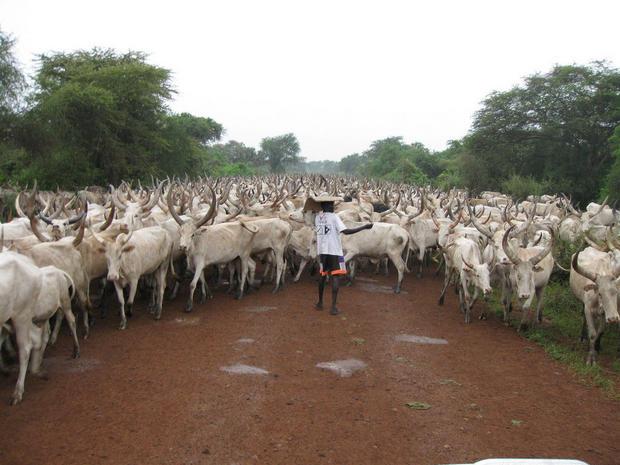Kenya: Truth, Justice, Reconciliation, and… Land Tenure Reform?
This article is part of a debate organized by Oxford Transitional Justice Research (OTJR) in collaboration with Moi University (Eldoret) and Pambazuka News. A selection of essays based on this debate will be published in an edited volume by Fahamu Books. For PDF documents of the debate please go to www.csls.ox.ac.uk/otjr.php.
The Kenyan Truth, Justice and Reconciliation Commission (TJRC) is mandated to enquire into human rights violations, including community displacements, settlements, evictions, historical land injustices, and the illegal or irregular acquisition of land, especially as these relate to conflict or violence. access to land is often cited as one of the key structural causes of violence in Kenya. However, political figures have manipulated and misrepresented the ‘land issue’ in the country, to the extent that it often seems to be an excuse, rather than a valid grievance. How should the TJRC address the land issue, which is so easily instrumentalized and so deeply linked to problematic conceptions of ethnicity? In order to answer this question, we first have to ask: why is the land issue relevant today?
The British colonial regime in Kenya caused significant disruptions to landholding patterns in many parts of the country, which still reverberate today, at the level of ‘high politics’ as well as ‘folk politics’. Land held under customary tenure by Kenyan communities was treated as ‘vacant’ by the colonial regime and appropriated for ranching and farming by white settlers. Even when the colonial government created ‘native reserves,’ land remained under the control of the Crown and hence vulnerable to alienation by the state at any time. Large parts of the central highlands, historically home to the Kikuyu and other communities, were appropriated for settler agriculture. Former inhabitants of these areas were forced into farm labour elsewhere in the country. Parts of the Rift Valley were also greatly affected. During the war of resistance, the members of the Land and Freedom Army fought for a restoration of land rights as part of a wider liberation from colonialism.
Under the terms of the independence agreement negotiated at Lancaster House, the administration of President Kenyatta pledged to respect ‘private property’, without regard to the ways in which land had been acquired. Rather than returning the areas appropriated by white settlers to customary tenure, the government accepted a ‘willing buyer, willing seller’ approach. Former farm workers, many of them Kikuyu, took advantage of the land-buying schemes offered by President Kenyatta to purchase plots in areas which remain a focus of discontent and periodic violence today.
Like the colonial Governor before him, the President held great powers over land distribution, with few checks and balances. Land owned under custom remains the private property of the government, and pastoralist land is supposedly held ‘in trust’ for local communities by the government. However, in practice Trustland is often sold-off, whether or not the sale is in the public interest. Official policy has always been to replace customary tenure with a freehold title system. This has left many communities, particularly pastoral groups in the Rift Valley, feeling that land customarily held ‘in common’ by their communities was vulnerable to alienation. Public land has been illegally distributed by the political elite in order buy the loyalties of their ‘clients’. Prominent families amassed huge farms and ranches under both Kenyatta and Moi. Government resettlement schemes were affected by corruption, leading to further inequality in landholdings. More generally, corruption became entrenched in the surveying and cadastral services, casting doubt on the validity of titles and creating serious land tenure insecurity which persists today.
Grievances over land access have regularly been manipulated by politicians in order to foment political violence. In 1992, KANU politicians organized violence against Kikuyu communities in ethnically-mixed areas to displace potential opposition voters. Some 1500 people died in 1992. Land-related grievances were used to mobilize mobs and justify violence, often wrongly described in the media as ‘land clashes’. Following incitement by KANU politicians during the 1997 elections, hundreds of thousands of people were forced from their homes. However, little was done to find long-term solutions to the resulting internal displacement problem. The Akiwumi Commission of enquiry into the violence recommended that the role of specific individual administrative and political figures in planning the killings be investigated. However, these recommendations were ignored.
Land issues are multidimensional: at the micro level land is an economic asset which benefits individuals, and land access becomes an increasingly important political issue as land-scarcity increases. At the meso level it represents an intangible ‘community territory,’ which perhaps explains why major land-owners are able to publicly articulate ‘communal’ grievances over land. It is undeniably linked with the calls for Majimbo, discussed by Daniel Waweru in his paper. However, it is not just about ‘sons of the soil’ controlling land. When land uses change – for example, when pastureland is converted to farmland, or vice-versa – there are real social and environmental repercussions for neighbouring communities.
So, land issues are clearly important, in the sense that they are both deeply-felt, and have been used to mobilize violence. How then has the government of Kenya addressed these problems? The National Rainbow Coalition (NARC) came into power on an anti-corruption platform. The new government expressed early support for a truth commission; however, it failed to establish one. Some of the alleged perpetrators of violence in the 1990s were incorporated into the NARC government. NARC also failed to adequately provide for those who had been displaced in political violence, and who continued to live in terrible conditions. The government created a Task Force on Displaced People, but its work has been very heavily criticized. President Kibaki’s government did establish the ‘Ndung’u’ Commission’ into illegal allocation of land, which recommended that ultimate responsibility for land rest with a National Land Commission, rather than the president, and that a review of land titles be initiated. The findings of the Commission were largely welcomed by Kenyan land specialists. However, few of the report’s recommendations were implemented. While the fundamental and systemic aspects of the land problems identified by the Commission’s report have been left to fester, evictions of communities from ‘gazetted’ (protected) forest areas such as the Mau Forest and Mt. Elgon Forest have been implemented with excess force and without resettlement of many of those evicted. In some cases, evictions exacerbated local ethnic and political tensions. Gains from illegal land acquisition have since been utilized to fund election-related violence.
The government also formed a Committee of Eminent Persons in 2006 to report on the key concerns of Kenyans and their implications for constitutional reform. This report was written, but has never been released.
To date, the establishment of ad hoc commissions of enquiry appear to have served as useful diversions, tying up the resources of government and other stakeholders in the development of recommendations which are rarely implemented. Despite these disappointments, the existence of those reports in the public domain does represent a basis for advocacy and debate. The issues are out in the open, and the major land-grabbers and the flashpoints of conflict are known.
Therefore, if the TJRC is to address land issues, will it just produce more empty recommendations, destined to be ignored? Several truth commissions in other parts of the world, such as Timor-Leste, have identified land-related inequality and human rights abuses as a root cause of conflict, but their calls for further action have not always been implemented. Those implicated in land-grabbing and other injustices are typically amongst the political elite, and able to block reforms.
However, despite Kenya’s history of ‘paper tiger’ commissions, there are glimmers of hope that the TJRC could go further than that: First, the national Land Policy, drafted in 2006, was finally approved in June 2009. The policy is seen by many as a progressive document providing protection for those communities using land under communal tenure systems, and calls for compensation and reparation for historical injustices. The country now has a practical framework for the implementation of the TJRC’s recommendations regarding land. Second, the Chair of the TJRC, Ambassador Bethuel Kiplagat, is an expert on the causes of conflict in Africa and is no doubt well-aware of the socio-economic dimensions of violence in Kenya, including land issues. He should be able to guide the TJRC towards the development of practical and far-reaching recommendations. Third, there are a sufficient number of skilled people, in government and civil society, who are committed to land tenure reforms. They should ensure that the TJRC does not turn into a gravy train for land experts, but results in clear outcomes. Fourth, it is reasonable to expect that international donors, who have supported the Land Policy development process, will use their leverage to ensure that land reform happens. Donors were united in the face of the 2008 violence; they should unite on the land issue, and refrain from letting their own ideological positions get in the way of Kenya’s much-needed reforms.
There are compelling reasons to address the land issue in a comprehensive way. Reform will reduce popular grievances, and take away one of the most effective rallying cries available to those inciting violence. Seizing ‘grabbed’ land will remove a source of revenue from corrupt politicians and businessmen who are willing to pay unemployed youth to engage in violence. Punishing those who have committed land-related crimes will be a concrete step towards reinforcing the rule of law for all and doing justice on behalf of all those who have struggled, since the pre-independence days of the Land and Freedom Army, to claim their rights. Applying legal sanctions against the major land-grabbers will also defuse the perceived ‘ethnic’ aspects of the land question. Those guilty of injustices around land are not, after all, entire ethnic communities, but specific members of the elite who abuse their economic and political power. The TJRC should prevent them from doing so, through recommending effective land tenure reforms.
*Chris Huggins was based in Kenya from 1998-2005. He is a specialist in conflicts over land and natural resources, particularly in Africa, and a PhD candidate at Carleton University, Ottawa. He recently contributed a chapter on “Linking Broad Constellations of Ideas: Transitional Justice, Land Tenure Reform, and Development” to Pablo de Greiff and Roger Duthie, (eds), Transitional Justice and Development: Making Connections (New York: Social Science Research Council, 2009)”
References
Commission for Reception, Truth and Reconciliation in East Timor (CAVR) (2005) Chega! The Report of the Commission for Reception, Truth and Reconciliation in East Timor. Dili: CAVR. Available online at http://www.cavr-timorleste.org/chegaFiles/finalReportEng/07.9-Economic-and-Social-Rights.pdf
Kamungi, P. and J. M. Klopp. (2007). “Failure to protect: Lessons fromKenya ‘s IDP network”, Forced Migration Review, 28. 52-53 Available online at http://www.fmreview.org/FMRpdfs/FMR28/29.pdf
Republic of Kenya (2009) National Land Policy. Nairobi: Ministry of Lands. Draft version available online at www.ilegkenya.org/pubs/docs/DraftNationalLandPolicy.pdf
Southall, R. (2005) ‘The Ndungu Report: Land & Graft in Kenya”. Review of African Political Economy, , March 2005, pp.142-51. Available online at .oxfam.org.uk/resources/learning/landrights/downloads/ ndungu_report_land_graft.rtf
Wakhungu, J., and E. Nyukuri and Huggins, C. (2008) Land Tenure and Violent Conflict in Kenya: Consultative Conference Proceedings Report. Nairobi: ACTS Press. Available online at www.landcoalition.org/pdf/ACTS_LandConflict_report.pdf
We welcome links to this article and comments. Reproduction or redistribution of the above text requires the prior consent of the original source. Please contact [email protected]






Excellent work adden your link in my blog http://4540.a.hostable.me/?page_id=19 , Keep up blogging 🙂
Nice insights. The design of the blog is good as well as the content of the article.
The Kenyan people must have the right for their land. And this right must be secured so they would be able to do what they do for living without the thought that their land will be taken away from them anytime. Very nice post. I like the blog too.